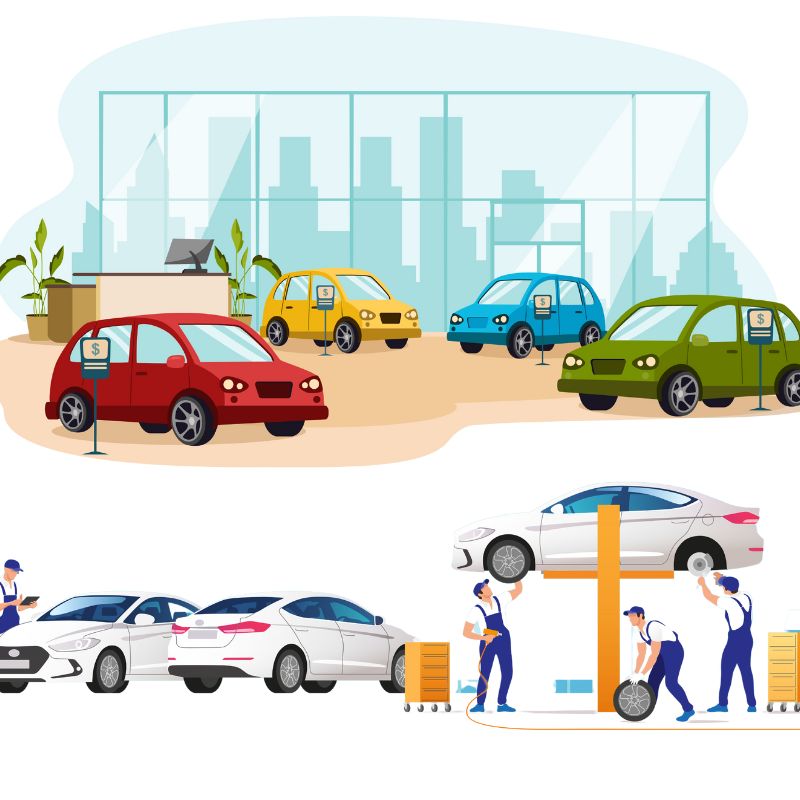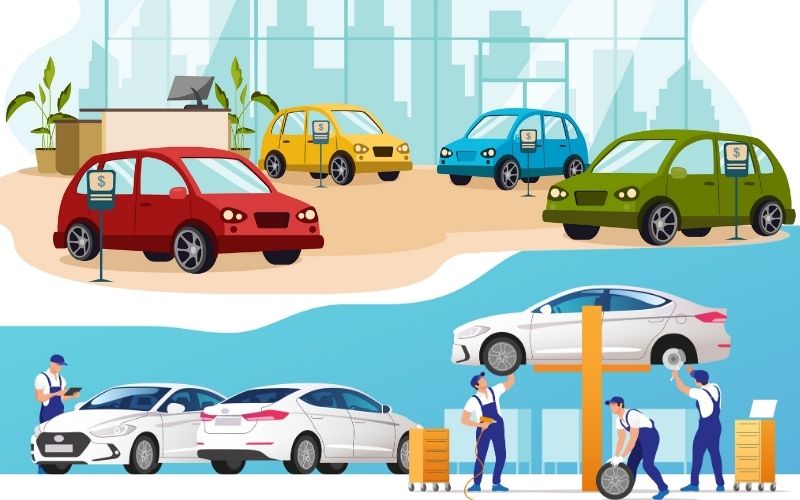Car dealerships are complex businesses that require the coordination of different departments to succeed. Two essential aspects of dealership operations are fixed ops and variable ops. Understanding these operations is crucial to running a successful dealership. In this article, we will explore the differences between fixed ops and variable ops, what fixed ops managers do, and the roles of variable operations in a dealership.

Table of Contents
- What is Fixed Ops at a Dealership?
- Fixed Ops vs. Variable Ops: What’s the Difference?
- The Importance of Fixed Operations in a Dealership
- The Role of a Fixed Ops Manager in a Dealership
- Understanding Variable Operations in a Dealership
- The Rivalry and Work Relationship Between Fixed Ops & Variable Ops
- Examples of Successful Fixed Ops & Variable Ops in United States
- FAQs
What is Fixed Ops at a Dealership?
Fixed ops are the departments of a dealership that deal with maintenance, repair, and other services provided to customers after they have purchased a vehicle. These departments are crucial to the success of the dealership as they provide a significant source of revenue.
Fixed ops departments include the service department, parts department, and collision center. The service department provides maintenance and repair services, while the parts department provides the parts and accessories needed for the vehicle. The collision center handles repairs for vehicles involved in accidents.
Fixed Ops vs. Variable Ops: What’s the Difference?
Fixed ops and variable ops are the two primary departments in a dealership. Variable operations, also known as front-end operations, refer to the departments that deal with selling vehicles to customers, such as sales and finance. Fixed ops, on the other hand, deal with the maintenance and repair of vehicles.
The primary difference between the two is that variable ops generate revenue by selling vehicles, while fixed ops generate revenue by providing services after a vehicle has been sold. While variable operations are the primary source of revenue for dealerships, fixed operations are essential for building long-term customer relationships.
The Importance of Fixed Operations in a Dealership

While variable operations generate revenue for the dealership, fixed operations are crucial for building long-term customer relationships. Providing excellent service after the sale can encourage customers to return to the dealership for future purchases.
A successful fixed ops operation can also generate additional revenue for the dealership by providing customers with additional services, such as detailing or accessories. Building a robust fixed ops operation can help ensure the success and longevity of a dealership.
Additionally, it’s important to note that parts and accessories are typically included as part of fixed ops departments in a dealership. The parts department provides customers with necessary replacement parts and accessories, while the service department handles the installation and maintenance of these parts. This comprehensive approach to vehicle maintenance and repair is an essential part of a successful dealership.
The Role of a Fixed Ops Manager in a Dealership
The fixed ops manager is responsible for overseeing the different departments that make up the fixed ops operation. Their primary role is to ensure that the department operates efficiently and that customers are satisfied with the service they receive. Some of the responsibilities of a fixed ops manager include the following:
- Creating and managing budgets for the department
- Hiring and training employees
- Overseeing the scheduling of repairs and maintenance services
- Ensuring that the department is compliant with safety and environmental regulations
- A successful fixed ops manager understands the importance of building long-term relationships with customers and creating a positive service experience that encourages customers to return to the dealership for their maintenance and repair needs.
Understanding Variable Operations in a Dealership

Variable operations, as previously mentioned, are the departments that deal with selling vehicles to customers. These departments include sales, finance, and marketing.
Sales departments are responsible for selling vehicles to customers, while finance departments assist with financing and lease agreements. Marketing departments create campaigns and promotions to attract potential customers.
The primary goal of variable operations is to generate revenue by selling vehicles. To be successful, these departments must work together to provide an exceptional customer experience that meets the needs and wants of potential buyers.
The Rivalry and Work Relationship Between Fixed Ops and Variable Ops
While fixed ops and variable ops are both essential to the success of a dealership, they can often have a rivalry due to the difference in revenue generation. Fixed ops departments may feel that their contributions to the dealership’s success are undervalued compared to the revenue generated by variable ops departments.
However, a successful dealership recognizes the importance of both departments and encourages collaboration between fixed ops and variable ops. By working together, these departments can provide a comprehensive customer experience that meets the needs and wants of potential buyers while building long-term customer relationships.
The general manager of a dealership typically comes from the variable ops side of the business. However, a successful general manager understands the importance of fixed ops and works closely with the fixed ops manager to ensure that the department operates efficiently and that customers are satisfied with the service they receive. A well-run dealership that prioritizes both fixed and variable ops can provide customers with an exceptional experience that encourages them to return for future purchases and services.
Examples of Successful Fixed Ops and Variable Ops Franchise OEM Dealerships in the United States
There are many successful franchise OEM dealerships in the United States that prioritize both fixed ops and variable ops departments and provide customers with exceptional service. Here are a few examples of individual rooftop dealerships:
Variable Ops:
Galpin Ford – Los Angeles, CA: Galpin Ford is the world’s #1 volume Ford dealer in the world and has been in business since 1946. They prioritize customer experience and have a large selection of new and used vehicles.
Hendrick BMW – Charlotte, NC: Hendrick BMW is a dealership that specializes in luxury vehicles and has won numerous awards for their exceptional customer service. They prioritize employee development and have a large service center.
Fixed Ops:
Tom Wood Toyota – Indianapolis, IN: Tom Wood Toyota is a dealership in business since 1967 and has won numerous awards for their fixed ops departments, including the Toyota President’s Award for outstanding customer service. They prioritize employee development and have a large service center.
Priority Toyota – Chesapeake, VA: Priority Toyota is a dealership that has been in business since 1999 and has won numerous awards for their fixed ops departments, including the Toyota President’s Award for outstanding customer service. They prioritize customer satisfaction and have a large parts department.
These successful franchise OEM dealerships prioritize both fixed ops and variable ops and provide customers with exceptional service. By working together, these departments can provide a comprehensive customer experience that meets the needs and wants of potential buyers while building long-term customer relationships.
In conclusion, understanding the difference between fixed ops and variable ops is essential for running a successful dealership. While variable operations generate revenue through selling vehicles, fixed operations provide the necessary services to build long-term customer relationships and generate additional revenue for the dealership. The role of a fixed ops manager is crucial in ensuring that the department operates efficiently and provides exceptional service to customers.
By working together, fixed ops and variable ops can help ensure the success and longevity of a dealership. A well-run dealership that prioritizes both fixed and variable operations can provide customers with an exceptional experience that encourages them to return for future purchases and services.
FAQs
- What is the difference between fixed ops and variable ops at a dealership?
Fixed ops departments deal with maintenance, repair, and other services provided to customers after they have purchased a vehicle, while variable ops departments deal with selling vehicles to customers.
- What does a fixed ops manager do at a car dealership?
A fixed ops manager is responsible for overseeing the different departments that make up the fixed ops operation, ensuring that the department operates efficiently, and that customers are satisfied with the service they receive.
- What are some of the responsibilities of a fixed ops manager?
A fixed ops manager’s responsibilities include creating and managing budgets, hiring and training employees, overseeing scheduling, and ensuring the department is compliant with regulations.
- What are variable operations in a dealership?
Variable operations are the departments that deal with selling vehicles to customers, such as sales, finance, and marketing.
- Why are fixed operations essential in a dealership?
Fixed operations are essential in building long-term customer relationships and generating additional revenue for the dealership. Providing excellent service after the sale can encourage customers to return to the dealership for future purchases.
- What departments are included in fixed ops at a dealership?
Fixed ops departments typically include the service department, parts department, and collision center.
- What services are provided by the parts department in fixed ops?
The parts department in fixed ops provides parts and accessories needed for the vehicle, such as replacement parts and custom accessories.
- How do fixed ops and variable ops work together in a dealership?
Fixed ops and variable ops work together to provide a comprehensive customer experience. Variable ops generates revenue by selling vehicles, while fixed ops provides the necessary services to build long-term customer relationships and generate additional revenue.
- What are the benefits of a strong fixed ops operation?
A strong fixed ops operation can help ensure the success and longevity of a dealership by providing customers with exceptional service and building long-term relationships. It can also generate additional revenue for the dealership through services such as detailing and accessories.
- What qualifications does a fixed ops manager need?
A fixed ops manager typically needs a bachelor’s degree in business administration or a related field and extensive experience in automotive service and management.






